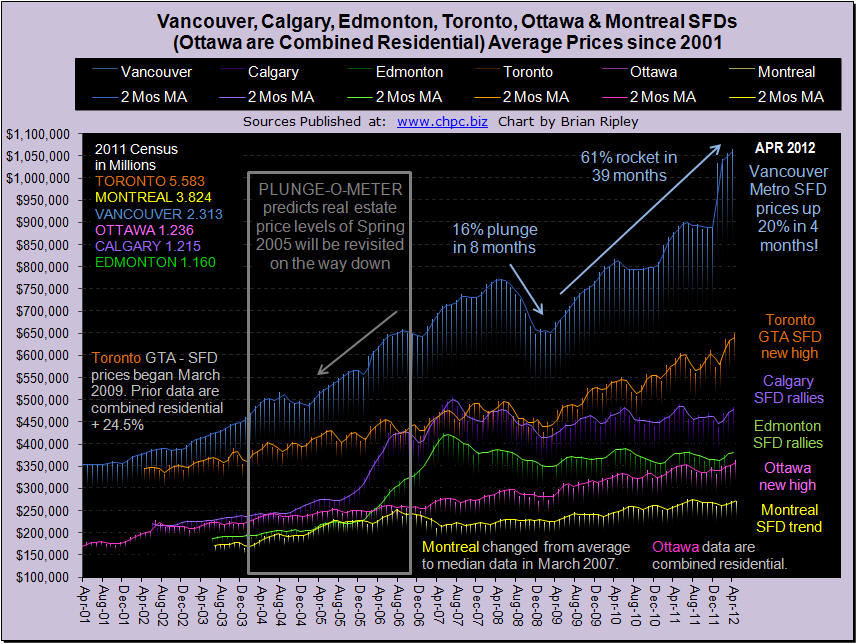Personal Finance

»» Most equity markets traded lower for the second-straight week. European risks dominated investors’ attention.
»» For Greece, an “orderly exit” from the Eurozone is like an oxymoron (page 2).
»» While we’ve been quite cautious about Europe for a long time, some perspective is in order. (page 3)
»» Global Roundup: Updates from the U.S., Canada, Europe, and Asia. (pages 3-4)

The chart above shows the detached housing prices for Vancouver, Calgary, Edmonton, Toronto, Ottawa* and Montréal (*Ottawa are combined residential). In April 2012 urban flippers continued reeling in accommodating buyers who jumped at asking prices on detached dwellings pushing them to new record highs in Vancouver, Toronto and Ottawa on energetic sales in the east but divergent negative sales in Vancouver (Scorecard). Calgary and Edmonton held and added to their gains from last month but their peak prices happened years ago in the Spring and Summer of 2007 (Plunge-O-Meter). The 10yr less the 2yr spread continues to narrow (35th month since May 2009). The last time this happened, the 10yr less the 2yr spread narrowed from Spring 2004 to Summer 2007 (similar duration as now) which set up the 2007-2009 crash. It’s an interesting comparison, buckle up.
All Data & Charts from Canadian Housing Price Charts
I Really Don’t Want To Do This But It Could Really Improve Your Investment Returns – Michael Campbell via Money Talks
…..continued:
I hate getting junk mail so let me start by saying that if you’re not interested in taking advantage of the most successful investment strategy I personally use then don’t read another word – and please forgive the interruption.
If you are still reading then let me help you decide if what I am about to tell you is of interest to you. I am talking about a method I use regularly to increase the rate of return in the “solid growth and income” section of my portfolio. For example – and this is NOT a recommendation – if you wanted to increase the income from owning the Bank of Montreal common shares ($57), which currently pay a 4.8% dividend to something in the order of 8% then all you would have to do is to sell call options. At today’s prices you could sell someone the right to buy the stock from you at $60 any day until December 21, 2012. If they decide to buy it from you your annualized return would be over 15%. If they don’t buy it form you your annualized rate of return is 9% – with an opportunity to raise it further by selling another call option.
Sound confusing? Well that’s why I have agreed to do a workshop on the selling of put and call options. I don’t want to do it. It’s going to take a lot of work putting together a program that people will not only be able to understand but will also be able to implement immediately. And let me be clear, I have no problem whatsoever if you don’t want to come. I am doing this workshop to fulfill one of my own goals of doing whatever I can to help people to improve their investment performance and secure their financial future.
It kills me to talk to people or read their emails and know that they are not taking advantage of the most effective method I know to improve their investment returns. I am not talking about a short-term homerun strategy. I am talking about pushing your return up from that 2, 3, 4% range to something above 10% and more with the use of a lower risk strategy. And one I might add that the investment industry does a very poor job of utilizing.
By the way, selling calls as I have described above is only one of the strategies I’m going to explain. The other main strategy deals with selling put options with the goal of acquiring quality stocks at 10% or more below the current market price. Let me give you another quick example. Let’s say you were interested in buying gold by using the gold ETF, GLD, but you’re worried it’s going to drop further. Yet at the same time you think that over time gold is going up and you don’t want to miss the move. One way I have solved that dilemma personally – and made a lot of money – is to sell a put, which means I have sold someone the right to sell me GLD at a specific price for a specific time.
For example, as I write this GLD is selling at $1600. Right now I can sell someone the right to sell me GLD at $1600 any day up until January 18th next year and I will receive $102 per ounce. In other words if he sells me the gold my cost will be $1498 – and if he doesn’t sell it to me (because he could sell gold for more in the open market), then I keep the $102 per ounce he paid me. And I can sell another put.
Again, confusing? Well that’s why I am doing the workshop. It is a workshop that deals with improving the yield on stocks you already own and paying less for stocks you want to own. My bet is that after you attend you will say, “why the hell didn’t someone tell me about this sooner.” In my opinion they should have but because way too many in the investment business don’t use these strategies I thought I’d better do something about it.
Don’t worry if you don’t have a clue about this stuff. The workshop is going to be split in two. I am going to start with a pre-workshop seminar to teach the basics of “put” and “call” options for people who aren’t familiar with options. We’ll take a break and then I’ll start with the main workshop detailing the strategies I personally use.
I want everyone to leave with a clear understanding and being able to immediately implement the strategies if they so chose.
Anyways, you can decide if this is for you. What I can tell you is that using puts and calls in the way I will be outlining has been my most effective strategy in this market for a number of years. I have done shockingly well with it.
I think it is ridiculous that in this market environment of extreme volatility and low interest rates that you don’t have every strategy available to help you succeed but that’s up to you. You can take a couple of hours to learn these strategies or not. I just wanted to do my job and make the information available. And I can honestly say, I can’t see myself doing this again.
I wish you all the best,
Michael Campbell
PS Originally High Performance Events were going to charge $295 – and to be honest I said that it was worth a heck of a lot more. I boasted to them that I could make that money back almost immediately but I also want to make it more affordable. So I ask them to see if they could get some sponsors to offset some of the costs. Plus we donate money to Special Olympics after every event I do.
So they went out and got Disnat, McLeod Williams, Kiska Metals and the Watermark at Sechelt on board, which enables us to offer the following ticket package.
Date: May 30 , 2012
Place: Sheraton Wall Centre Vancouver
Time: Per-Workshop Option Basics – 6:00 pm to 6:40 Options to Increase Your Investment Return Workshop 7:00 to 9:00 pm.
Price: $179 per ticket which includes :
• 3 free months free subscription to Money Talks exclusive Commentary Service that features a weekly comment from Michael plus exclusive contributions from Martin Armstrong, Mark Leibovit, Steve Briese, Bob Hoye, and Don Coxe.
• Unlimited access to the video recording of the event, which enables you to review everything at your leisure. This will retail for $119 but is included with the ticket.
• Plus we have arranged for follow-up seminars with Disnat further outlining how to use options. Complimentary for workshop attendees.
http://moneytalks.net/how-to-use-options-to-invest.html
Posted in All Posts by Peter Grandich.

Housing has now gone full circle. President Bush’s “Ownership Society” has morphed into the “Rentership Society”. The attitude applies to more than houses as noted in the Wall Street Journal article Renting Prosperity by Daniel Gross.
Americans are getting used to the idea of renting the good life, from cars to couture to homes. Daniel Gross explores our shift from a nation of owners to an economy permanently on the move — and how it will lead to the next boom.
In the American mind, renting has long symbolized striving — striving, that is, well short of achieving. But as we climb our way out of the Great Recession, it seems something has changed. Americans are getting over the idea of owning the American dream; increasingly, they’re OK with renting it. Homeownership is on the decline, and home rentership is on the rise. But the trend isn’t limited to the housing market. Across the board — for goods ranging from cars to books to clothes — Americans are increasingly acclimating to the idea of giving up the stability of being an owner for the flexibility of being a renter. This may sound like a decline in living standards. But the new realities of our increasingly mobile economy make it more likely that this transition from an Ownership Society to what might be called a Rentership Society, far from being a drag, will unleash a wave of economic efficiency that could fuel the next boom.
The reaction to extended leverage and foolish borrowing isn’t to stop consuming and buying; it is to consume and buy more intelligently. That’s what the Rentership Society is all about. And it starts at home. Literally. Housing is the biggest single component of consumption in the U.S. economy and the source of much of our present misery. According to the Bureau of Labor Statistics, the typical consumer spends about 32% of his or her budget on shelter. In the last decade, that generally meant borrowing a lot of money to take “ownership” of a home.
For an increasing number of Americans, though, it simply makes more sense to rent these days. According to Moody’s, by late 2011 it was cheaper to rent than to own in 72% of American metropolitan areas, up from 54% a decade ago. And the more people who do it, the more socially acceptable and desirable it becomes. The decline in the ownership rate means that about three million more households rent today than did at the height of the bubble.
Zipcars and College Textbooks
Gross points out that students are increasing renting books as opposed to buying them. Of course there are also Kindle and other electronic ways of purchasing or renting books as well.
The same holds true for cars, and not just long-term leases either.
Gross writes …
To Read More CLICK HERE

There are three times more condo high-rises being built in Toronto than in New York City and seven times’ more than in Chicago.
The condo bubbles in Toronto and Vancouver are caused by foreign speculation and are making housing unaffordable and creating financial risk for the country in terms of government-insured mortgages. But there’s another issue of vital concern to taxpayers.
There are three times more condo high-rises being built in Toronto than in New York City and seven times’ more than in Chicago. This boom is not the market at work, but is manipulation by “hot money” from abroad.
“I have come across something that I find astonishing, and which amounts to systemic tax fraud by investors, mostly foreign, on a massive scale,” wrote an investor involved in the industry.
He explained how it works:
1. Foreigners sign an agreement of purchase for a condo unit, or for 50 at a time, and put down a 5% deposit. This buys a right to buy the unit in future at a fixed price. In financial markets, this is known as a derivative.
2. Many developers include in the agreement of purchase the right to “assign” this right to buy at a fixed price. In financial markets, this is called creating a futures market. This assignment of a right to buy at a fixed price turns buyers into speculators (unless they want to move in or rent out the unit) who are set up to flip the units for a profit as prices are pushed upwards.
The Australians were victims of the same shenanigans and shut it down and now Canada must too
3. Some developers, and intermediaries, are in the business of helping speculators flip their rights and pocket a fee for doing so. For instance, Mr. X from Asia pays $15,000 for the right to buy a $300,000 condo, then, when the price of similar units rise to $400,000, he can assign the right, get his deposit back and make the $100,000 difference. There is a frenzy of this speculation going on which makes prices escalate so rights can be bought and resold over and over again before a building is completed.
4. The paperwork for these agreements is kept in-house and my source said one intermediary told him that there are no T-5s issued to the speculator or to the Canada Revenue Agency, something that stock and futures market intermediaries must do so that taxes can be paid on the $100,000 trading profits. Instead, the profits vanish, possibly along with the paperwork, and taxes paid will be by the end user if they buy, rent out the unit and make a capital gain down the road.
“[Condo] brokers tell me I can flip my assignment and pay no tax and there is no paper trail. They say we do it all day long,” said the investor who asked to remain anonymous.
Under CRA rules, foreigners making Canadian-sourced income are fully taxable by the federal and provincial governments. In Ontario or BC, the total tax bill would be 46% or $46,000 in tax for $100,000 profit.
The unpaid taxes could be staggering, said a real estate agent. In Toronto, 20,000 condo units have been sold each year for the past five years. Let’s assume one-quarter were sold to foreign speculators who flipped the assignment and made $100,000 profit without paying taxes. Their Canadian-sourced income would total $500 million a year, and they would owe 46% of that in taxes or $230 million.
Most condo developers may not be involved in this game, but a few – notably developers with Asian and Middle East owners or backers and buildings located in downtown areas – certainly are.
So this is what must happen. As I argued last week, Ottawa must forbid the purchase by foreigners of any residences in Canada as Australia did in 2010 after foreign speculation and tax evasion damaged its housing market.
The Canada Revenue Agency should send in auditors to the lawyers and intermediaries and developers who have the lists of those who signed agreements of purchase. If they did not close on those deals, and the deals sold for more money than the agreements, then auditors must work backwards and assess income taxes.
To Read More CLICK HERE














